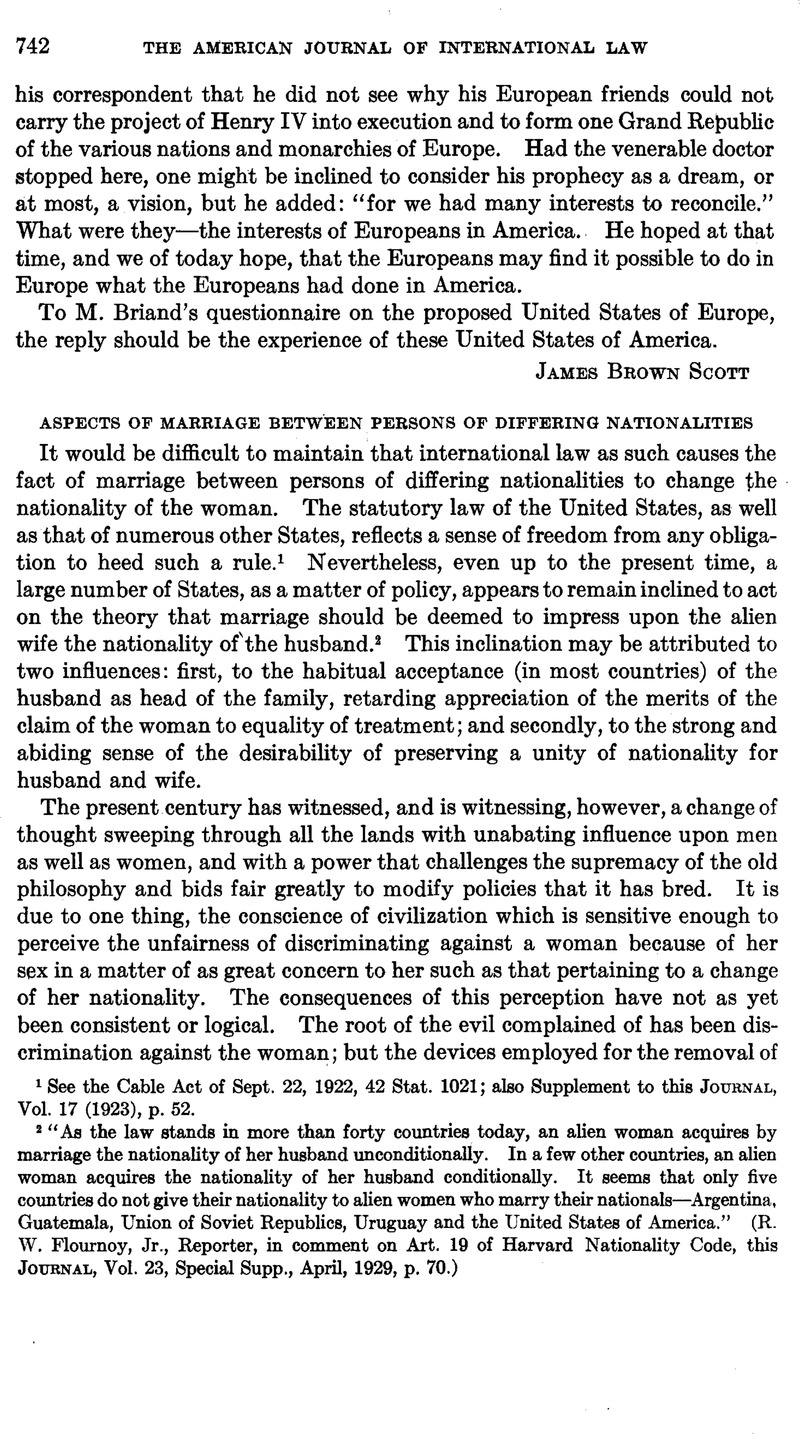No CrossRef data available.
Article contents
Aspects of Marriage Between Persons of Differing Nationalities
Published online by Cambridge University Press: 04 May 2017
Abstract

- Type
- Editorial Comment
- Information
- Copyright
- Copyright © American Society of International Law 1930
References
1 See the Cable Act of Sept. 22, 1922, 42 Stat. 1021; also Supplement to this Journal ,Vol. 17 (1923), p. 52
2 “ As the law stands in more than forty countries today, an alien woman acquires by marriage the nationality of her husband unconditionally. In a few other countries, an alien woman acquires the nationality of her husband conditionally. It seems that only five countries do not give their nationality to alien women who marry their nationals—Argentina, Guatemala, Union of Soviet Republics, Uruguay and the United States of America.” ( Flournoy, R.W. , Jr., Reporter, in comment on Art. 19 of Harvard Nationality Code, this Journal , Vol. 23, Special Supp., April, 1929, p. 70.Google Scholar)
3 The tendency of some proposals is merely to ameliorate the effects of discrimination against the woman under the system that accepts inequality of treatment as the normal basis or point of departure, rather than to eliminate that inherent defect. Thus, according to Art. 8 of The Hague Convention on Nationality of 1930: “ If the national law of the wife causes her to lose her nationality on marriage with a foreigner, this consequence shall be conditional on her acquiring the nationalityof the husband.” Again, Art. 9 provides that“ If the national law of the wife causes her to lose her nationality upon a change in the nationality of her husband occurring during marriage, this consequence shall be conditional on her acquiring her husband—s new nationality.” Art. 10 leaves nothing to be desired in providingthat “ Naturalization of the husband during marriage shall not involve a change in the nationality of the wife except with her consent.” Art. 11 declares that “ The wife who, under the law of her country, lost her nationality on marriage shallnot recoverit after the dissolution of the marriage except on her own application and in accordancewith the law of that country. If she does recover it, she shall lose the nationality which she acquired by reason of the marriage.”
In the course of the Report to The Hague Conference on behalf of the First Committee (Nationality) it was said, in respect to the foregoing articles, by M. Guerrero, the Rapporteur:“ It was observed that the co-existence of these two principles—the freedom ofthe wife on the one hand and the unity of the family on the other—had the effect of increasing the number of cases of double nationality and also of statelessness. In point of fact a woman can lose her nationality through marriage with a foreigner, and being unable to acquire that of her husband can become stateless, while on the other hand, retaining the nationality she possesses by birth, she can also acquire that of her husband. For that reason the Committee, without attempting to decide in favour of either of the two existing systems—indeed that is rather the duty of the legislatures of the different countries—simply endeavoured to remedy some of the defects resulting from existing conditions and, in particular, the case of statelessness provided for in the text of this Basis.” (The convention and report are printed in Supplement to this Journal , July, 1930 (Vol. 24), pp. 192, 215.)
Art. 19 of the Harvard Nationality Convention provides that “ A woman who marries an alien shall, in the absence of a contrary election on her part, retain the nationality which she possessed before marriage, unless she becomes a national of the State ofwhich her husband is a national and establishes or maintains a residence of a permanentcharacter in the territory of that State.” (This Journal , Vol. 23, Special Supp.,April, 1929, p. 16; also comment by R. W. Flournoy , Jr., Reporter, id., pp. 69-76.)
See also Art. 3 of model statute embraced in Report of Committee on Nationality and adopted by the International Law Association, Sept. 9, 1924, Report, Thirty-Third Conference, International Law Association, pp. 28, 32; Articles 8-10 of Draft Convention submitted by League of Nations Committee of Experts for the Progressive Codification of International Law, Jan. 29, 1926 (League of Nations Doc. C. 196. M. 70. 1927, V. 27); Articles 4 and 5 of Resolution adopted by the Institute of International Law, at Stockholm, 1928, Annuaire, XXXIII, pt. 2, 760-761. The texts of these documents are printed as appendices to the comment on the Harvard Nationality Convention, this Journal , Vol. 23, Special Supp., April, 1929, pp. 119-123, and 125-126.
4 Declared Miss Chrystal MacMillan. in her report as Chairman of the Nationality Committee of the International Federation of University Women, for submission to the First Codification Conference of the League of Nations, at The Hague, 1930: “ There would be no objection to limiting the woman's right of choice at the time of her marriage if the same limitations were placed on the man at the time of his marriage, but no proposals of this kind are put forward” (p. 13).


